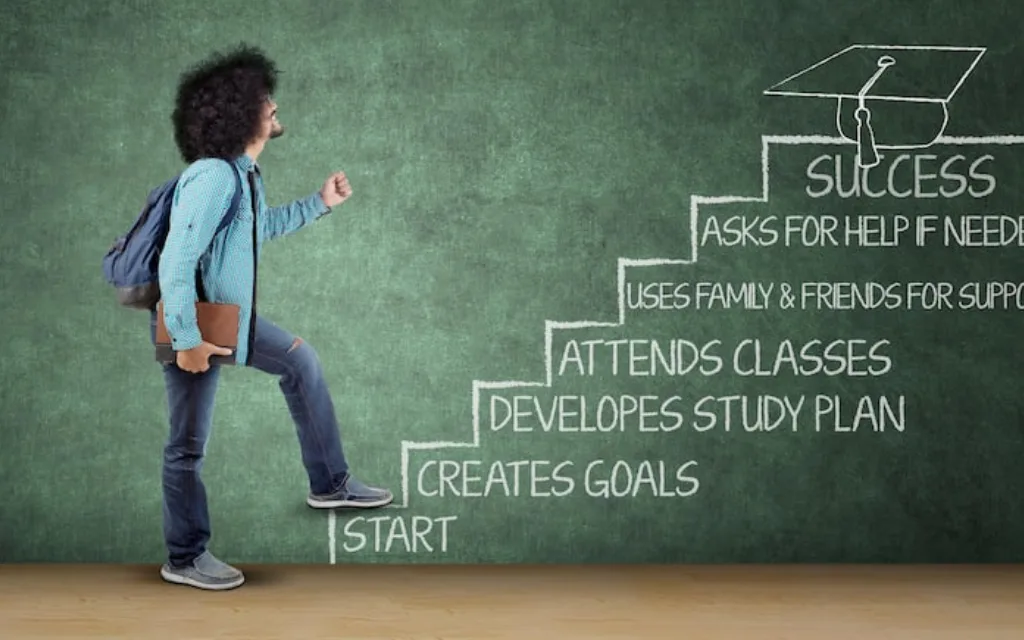How to Set and Achieve Your Educational Goals for Lifelong Success 2025
Introduction
From the moment we begin learning, we encounter the idea of educational goals. Whether it’s a child aiming to learn the alphabet or a college student preparing for a final exam, educational goals play a central role in shaping the way we learn, grow, and evolve. These goals are not limited to completing assignments or passing tests — they are the foundation of long-term academic success and personal development.
Educational goals provide direction. They help us make intentional choices about what to study, how to study, and why we’re studying in the first place. When students, professionals, or lifelong learners set clear goals for their education, they create a roadmap that leads not only to better grades but also to increased confidence, improved skills, and more rewarding careers.
In this article, you’ll explore how to create and follow meaningful educational goals that align with your passions, values, and future plans. Whether you’re in high school, college, or pursuing continuing education, learning how to define and pursue your goals effectively can transform your academic journey and prepare you for long-term success. We’ll also explore how your learning goals connect to broader academic objectives, future career development, and the habits that support lifelong learning.
What Are Educational Goals?
Educational goals are clearly defined learning targets you set for yourself to guide your academic and intellectual growth. These goals act as a compass throughout your educational journey — helping you stay focused, motivated, and on track. They can be broad or specific, short-term or long-term, depending on your personal needs, educational level, and aspirations.
For instance, a short-term educational goal might be to improve your writing skills by the end of the semester. A long-term goal could be earning a degree in environmental science or becoming fluent in a second language. Regardless of their scope, educational goals are a crucial part of effective learning, career preparation, and personal development.
These goals often overlap with other forms of self-improvement such as academic objectives, learning goals, and career goals. While academic objectives are typically focused on performance (like achieving a high GPA or scoring well on standardized tests), educational goals may also include developing soft skills, adopting new habits, or gaining deeper knowledge in specific subject areas.
To be truly effective, educational goals usually have the following characteristics:
1. They Are Specific and Clear
Vague goals like “do better in school” are hard to follow through on. Instead, clear goals such as “increase my biology grade from a B to an A by the end of the semester” provide a defined direction and purpose.
2. They Are Measurable
Progress should be trackable. You should be able to look at your goal and determine whether you are getting closer to achieving it. For example, a measurable goal could be “complete five chapters of my math textbook every two weeks.”
3. They Are Realistic and Achievable
Ambition is important, but your goals should match your current situation. Setting educational goals that are too difficult or time-consuming can lead to frustration and burnout. Realistic goals consider your available time, energy, resources, and support.
4. They Are Connected to Long-Term Plans
Effective educational goals are not isolated. They should align with your long-term ambitions — whether that means entering a particular profession, mastering a field of study, or simply becoming a more well-rounded individual. When your goals reflect your broader career aspirations or personal interests, they become more meaningful and motivating.
5. They Encourage Skill Development
More than just academic achievements, your educational goals should support the development of practical and intellectual skills. These include critical thinking, time management, communication, and the ability to learn independently — all of which are essential for long-term success in any career or field.
6. They Adapt and Evolve Over Time
Your goals should grow as you grow. As your interests shift or your circumstances change, your educational goals should also be flexible. What you wanted as a first-year student may not be what you want later in your journey. Regularly reviewing and adjusting your goals ensures that they stay relevant and useful.
Why Educational Goals Matter
First, having well defined educational goals gives direction. Without them your study might drift without purpose. When you know what you aim for you can focus your time and effort.
Second, they help with motivation. If you have a learning goal to reach a certain grade or to learn a new skill, that sense of purpose helps you stay on track even when study feels difficult.
Third, educational goals improve time management. When you plan study sessions or projects around your goals you avoid wasted effort and can prioritize what matters most.
Fourth, they contribute to your long term growth. The academic objectives you set today shape your future opportunities. Whether applying for college or entering the workforce, having achieved specific learning milestones can open doors.
Types of Educational Goals
There are many kinds of educational goals you might set. Understanding different types helps you choose what matters most to you.
Short Term Goals
These are goals you hope to achieve within a few weeks to a year. For example, finishing a project, improving your ability to write essays, or scoring higher on your upcoming test. Short term educational goals are stepping stones toward bigger aims.
Long Term Goals
These span several years. They could include earning a degree, gaining professional certification, or mastering a foreign language. Long term educational goals require planning and consistent effort over time.
Performance Goals
These have to do with achieving high grades or rankings. They focus on measurable outcomes like GPA or test scores.
Learning Goals
Learning goals focus on gaining knowledge, skills, or a deeper understanding rather than just performance. For instance you might aim to understand a field fully, be able to think critically, or solve complex problems. Learning goals often sustain you beyond formal assessments.
How to Set Effective Educational Goals
Setting goals the right way increases the chances you will achieve them. Here are steps to set strong educational goals.
- Identify your values and interests
Understand what excites you academically and what aligns with your future plans. When educational goals match your passions you are more likely to stick with them. - Be specific
A goal like improving your writing is good but vague. A better educational goal might be writing one essay per week to improve grammar and style. - Make goals measurable
Use numbers or clear milestones. For example raise your average grade from 75 to 85 or read ten books in your subject area in one semester. - Ensure realism and time frame
You need goals that you truly believe you can reach given your schedule. A long term educational goal might be earning a masters degree in three years, while a short term stepping stone could be completing required courses each semester.
Connecting Educational Goals to Academic Objectives and Career Aspirations
Your educational goals should not exist in isolation. They are closely tied with your academic objectives and career aspirations. By aligning them you ensure that what you learn now supports what you hope to achieve later.
For example if you hope to work in engineering your education goals might include mastering mathematics, learning programming, gaining laboratory experience, or completing relevant internships. On the other hand if you aspire to be a writer your learning goals might involve enhancing vocabulary, reading widely, and practicing writing regularly.
When educational goals are aligned with your future desires you avoid wasted effort on things that do not support your dreams.
Planning and Tracking Your Educational Goals
After you set your goals the next step is planning how to reach them. Planning makes the difference between wishing and achieving.
Here is a process for planning and tracking educational goals
- Write down each goal in detail
- Break down long term goals into smaller tasks or milestones
- Set deadlines for each task
- Monitor your progress regularly and adjust if needed
Tracking helps you stay aware of what works and what needs change. Maybe one goal is too ambitious or one strategy is not helping. Adjusting is a normal part of growth.
Challenges in Achieving Educational Goals and How to Overcome Them
You will face obstacles in pursuit of your educational goals. Expect difficulties and prepare ways to handle them.
Some common challenges include losing motivation, time constraints, lack of resources, or fear of failure. To overcome these try renewing your interest by connecting your study to your passions. Use a schedule or planner to manage time. Seek help from teachers or peers. Celebrate small wins so you stay encouraged.
Developing Skills Alongside Educational Goals
While aiming for grades or degrees you also want to develop useful skills. These can help you reach your educational goals more easily and also make life richer.
Skills such as critical thinking, problem solving, communication, time management, self discipline and adaptability are essential. For instance if you develop strong study skills and time management you can handle more challenging educational goals without feeling overwhelmed.
Learning also involves finding effective study techniques like spaced repetition, active recall, summarizing information, teaching others and reading with purpose. These techniques support you in achieving your educational goals with greater ease.
Role of Support System in Meeting Educational Goals
You do not have to walk the educational path alone. A strong support system can make a big difference.
Teachers can guide you, mentors can share wisdom, classmates can provide encouragement, and family can offer emotional backing. If you share your educational goals with others they can help keep you accountable.
Also using resources such as study groups, online courses, libraries, and seminars can give you tools and opportunities that help you meet your goals.
Revisiting and Adjusting Educational Goals Over Time
As you grow you change. Your interests, abilities, and circumstances may shift. It is okay and even necessary to revisit your educational goals periodically.
Maybe a course you thought you wanted becomes less interesting or a different field becomes more attractive. Maybe your career aspirations shift or new opportunities appear.
Adjusting goals ensures they stay relevant and motivating. If one goal no longer makes sense, change it. If new passions emerge, add goals that reflect them. This flexibility keeps your journey honest and effective.
Examples of Strong Educational Goals
To help you think of your own strong goals here are some examples that show what good educational goals look like
- Improve mathematics grade from B to A by end of semester by studying two extra hours per week and using tutoring
- Learn basic programming in Python within six months by completing online courses and building small projects
- Read twelve books in the field of history in one academic year to deepen understanding and critical thinking
FAQs About Educational Goals
What is the difference between educational goals and learning goals
Educational goals tend to include both performance and learning aspects often tied to academic or career outcomes while learning goals focus more on mastery and understanding rather than grades or external recognition.
How many educational goals should I set at a time
It is best to focus on a few clear educational goals rather than many. Two to four major goals with some smaller ones allows you to stay focused and avoid burnout.
How do I stay motivated to achieve my educational goals
Connect your goals to what you care about. Visualize success, break tasks into manageable steps, celebrate progress and get support from others. Regularly reviewing your goals helps maintain motivation.
What if I fail to meet an educational goal
Failure is part of learning. Reflect on what went wrong, adjust your plan or time frame, seek help, and try again. Sometimes failing teaches you more than success.
When should I revisit or change my educational goals
You should revisit them regularly, for example at the start of each semester or when you experience major changes like shifting interests, new opportunities, or altered career plans. Change is natural and can bring positive growth.







